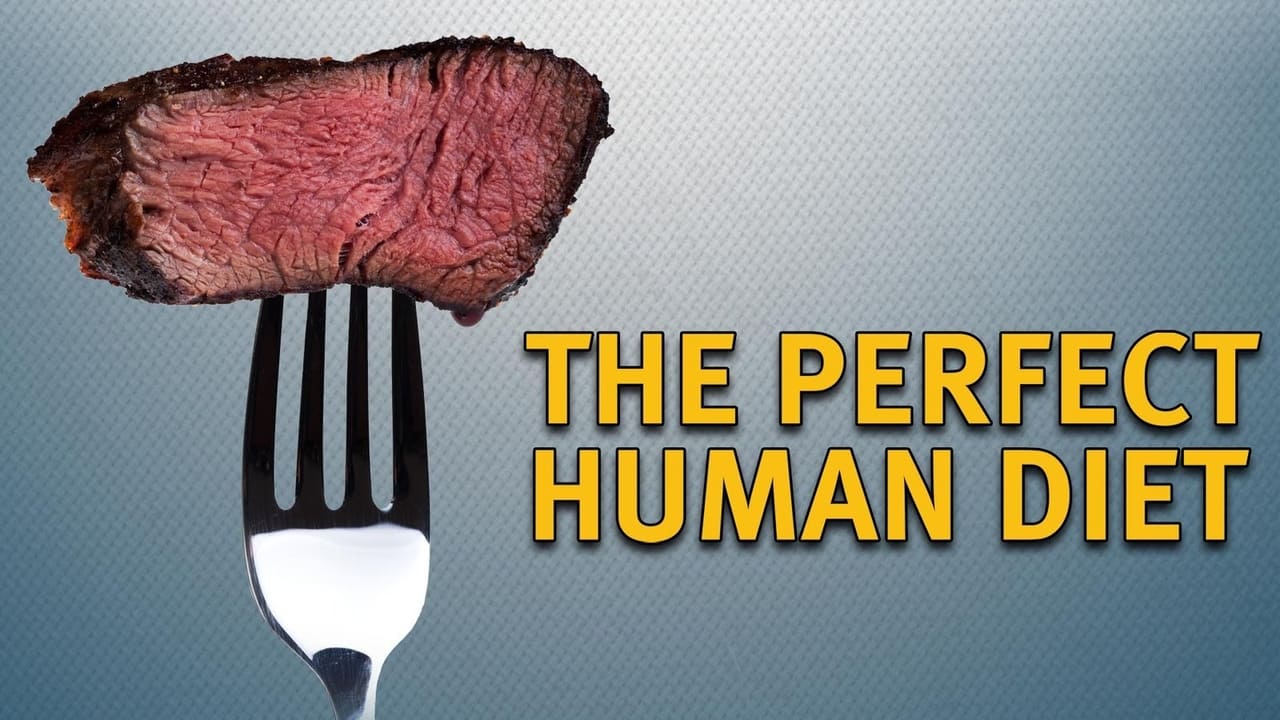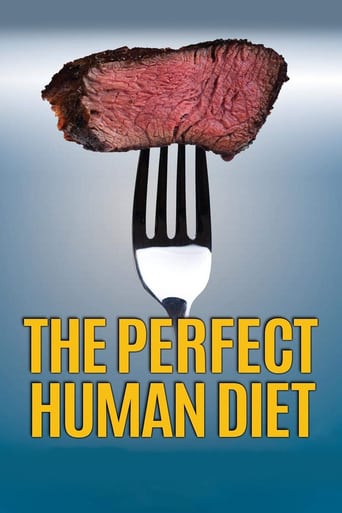

Wonderful character development!
... View MoreEach character in this movie — down to the smallest one — is an individual rather than a type, prone to spontaneous changes of mood and sometimes amusing outbursts of pettiness or ill humor.
... View MoreThe movie's not perfect, but it sticks the landing of its message. It was engaging - thrilling at times - and I personally thought it was a great time.
... View MoreA clunky actioner with a handful of cool moments.
... View MoreSo the message behind the film seemed to be eat more meat. Here are just a few problems I saw with the arguments the film use's to make that claim.1. Person claims humans have a herbivores digestive system. Obviously untrue (we are omnivores as are our closest relatives) but I'm not sure why he chose to feature a business owner selling soy jerky to make it other than it discredits people who support vegetarianism. Would have been better to either not addressed vegetarianism at all, or had some sort of expert to explain the relative upsides/downsides of a vegetarian diet. For example of the 4 of the 5 blue zones in the world have a plant based diet and the 5th is mostly fish.2. Person claims that all herbivores have four stomachs. This is factually not true. Horses, Rhino's, rabbits, and a host of other herbivores have a single stomach.3. If you have read In Defense of Food you know how complicated nutritional science is. The film implies that the old low fat movement came about with no scientific backing. To me that sounds more like an infomercial than a documentary. It's quite possible whatever evidence they were gathering was either misleading or misinterpreted but it would have been more illuminating to discuss what the specific errors were and why the modern science is better. Is the view the film is pushing the result of increases in knowledge or just the next fad. Personally I'm not sure and looking at this film critically doesn't go a long way towards convincing me.3. Person claims that there high carb proponents make no differentiation between processed an non-processed carbs after a scene at the vegetarian summit where a presenter specifically said avoid processed foods. This is sort of the base problem with the films premise. Humans have evolved to thrive on a pretty wide range of foods and whole grains are not that different from the foods we were eating previously. The problem is that in refining them we remove all but the least nutritionally dense portion of the grain and turn that nutritionally deficient substance into a large portion of or diet. That is far different from having a moderate amount of whole grains and a greatly increased level of more nutritionally dense vegetables which is the diet vegetarians actually promote. Again maybe paleo are right but you need to make a fair comparison to know one way or the other.4. The analysis by the plank institute only covers Europe, an area that earlier in the film noted has no plant food sources for a significant period of the year. Humans are opportunistic eaters they will eat what is available. If plants are not available they won't be a large portion of the diet. If you look at what we know about diets world wide the only thing they have in common is variety.5. When you make a film that is promoting establishment views you don't need to give outsiders a voice. The opposite is not true. At some point it would have been a good idea to have some sort of expert on to explain why the current recommendations exist and to weigh in on the benefits and disadvantages of the diet the movie.I think paleo is an overall fairly healthy diet. I think this film would have made a better case for it by focusing on modern studies showing it's benefits than focusing on one side of the debate over what our ancestors ate. It also seemed to miss that all the nutrients animals are getting come from the food they eat so if you're eating grain fed beef you're not making a huge improvement over eating the grains yourself.
... View MoreI've watched a lot of documentaries on health and eating habits and can I just say what a relief it is to finally have one with actual scientists and doctors. I have always been a heavy meat eater and I personally know many vegetarians with much worse health than I. My doctors are always amazed at how healthy I am with little exercise and a diet which includes meat in every meal. I have always avoided sugars my whole life. It was never a personal decision, I just have never enjoyed deserts and candy. My wife thought I was so odd when she met me and found I don't enjoy desert after dinner. My friends wonder why I'm not a thousand pounds and attribute it to genes. Carnivore for life.
... View MoreThe problem with the conclusion that this documentary comes to is it won't work! If all of humanity—seven billion strong and increasing—ate the "natural" quasi-Paleolithic diet that the scientists in this film find "perfect"...well they won't because with present technology it is impossible for the planet to feed that many people that high on the hog. Raising the necessary number of cows, pigs, chickens, etc. requires more land and fresh water than is available. It's as simple as that.The second problem involves a "what is, is right" kind of fuzzy thinking. The fact that our ancestors ate a lot more meat than they did grains does not mean that sort of diet is best. They ate that way because they had no choice.The third problem is that the kind of meat hunters and gatherers ate was a bit different from the fat-laden, choice cuts of meat eaten today. It was lean and grass-fed. And a lot of it wasn't meat at all. It was fish, shellfish, clams, mussels and insects.Aside from these three very important points the documentary is not bad. The film makes it clear that it is the modern diet of processed foods that is responsible for the obesity epidemic in the developed world. And yes the paleo-primal, hunter-gatherer diet is superior to the junk food that is shoved in our faces on TV, over the Internet, on billboards and at fast food restaurants.And yes meat- and fish-eating turned upright-walking dull-witted apes into hominids. Without high-quality foods we could not have grown our big brains. But that was then. This is now, and what is needed is a balanced diet of whole foods with plenty of fruits and vegetables, some carbs, some high protein foods, and oils from the trees: e.g., olives, avocados, coconuts, etc.—Dennis Littrell, author of "The World Is Not as We Think It Is"
... View MoreThe entire documentary is all built on flawed logic, flawed assumptions and flawed conjectures. basic gist is, since evolution and history says that for 99.9% of human history we humans have been hunter gatherers, our diet should be like that. But that is a very flawed way of thinking. Just because our ancestors were meat eaters doesn't mean meat is better than vegetables for us. Our ancestors were not exactly optimizing their potential, just because they were living like animals. Evolution does not create perfect scenarios and perfect species of perfect health, that is a fallacy this documentary is based on. It assumes our ancestors were eating a diet, that they had perfectly evolved into. Which is not the case. While i agree with half the documentary (the half condemning modern diet of processed foods), the other half of it is a load of pile of false truths and false logics. I present here some of these flaws the documentary ignores. 1) Our ancestors no doubt starved many months, many weeks, many days of the year, through winter, when they could not find hunt food to the point where many no doubt died. This documentary completely ignores this fact when promoting this high meat diet theory. 2) Our ancestors also ate insects, larvae, and other unhealthy and disgusting things, at no point do they start promoting a diet of insects. Which again is another example of picking and choosing history. 3) Our ancestors also didn't bath or clean themselves at all. No one would say poor hygiene and living and eating like a wild dog is better for us, just because our ancestors did it for millions of years. So why use the same premise for dieting? 4) another example since our ancestors never exercised and only exerted themselves when hunting, optimal health means we should not exercise unless chasing a deer. Which they probably only did once a month for a few minutes and only in large groups. 5) historically human societies have been fishermen rather than hunters. This a fact the video ignores, as game food was not guaranteed whist fish from the ocean or rivers largely was. Thus most civilizations were situated on coastlines and near rivers. Ultimately the point is, our ancestors did not have an optimal best perfect diet, trying to mimic them is like trying to copy a C student in an exam, you are not going to better a better grade. This is the poor logic used in this DVD, which is flawed. If you look at native aborigine populations in south America, Australia who are following very much our ancestors diet, and look at the athletes from the Olympics, anyone with half a brain can tell that the athletes in the Olympics are healthier and better. Our ancestors also rarely lived beyond 40, average lifespan was probably around in the late 30's. so evolution hasn't engineered the paleo-primal diet to exactly keep our body ship shape beyond 40 (going by their own logic). So that's another flaw in using the logic of our ancestors diet is evolutionary wise the best for us. Frankly documentary is a load of baloney. But they are right in that the paleo-primal diet is a million times better than the modern processed sugar, salt, spices, oils artificial chemical diet we have in the 21st century. But they need to De-emphasise the meat intake, as our ancestors if anything like normal hunter gatherers would most likely have not had much meat in their diet as consistently as modern lifestyles or the paleo-primal diet likes to infer. As you can't exactly catch and cook a deer with a spear 3 times a day. Even lions eat only once a week in the wild, sometimes once a month periodically, and even starve when the herd migrates. As hunting eating food isn't exactly on the dot, breakfast, lunch, tea and dinner time like we have made nowadays. Saying completely no to wheat is a fallacy as no doubt our ancestors must have eaten wild grain, in order for them to become farmers of the stuff. So it was part of their diet, which documentary ignores.
... View More